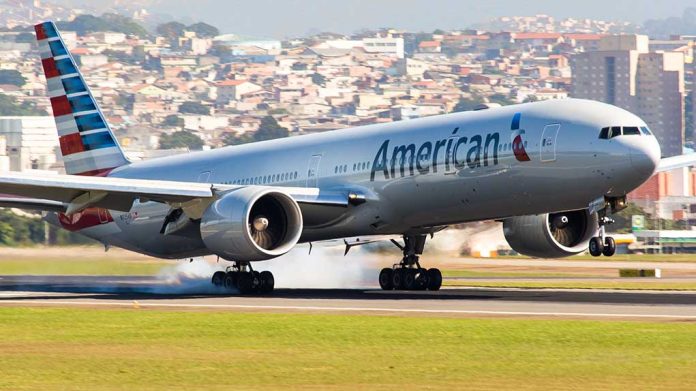
A careless Wi-Fi hotspot name caused chaos at Austin Airport, delaying an American Airlines flight for over four hours due to security concerns.
Key Takeaways
- An American Airlines flight was delayed after a Wi-Fi hotspot named “I have a bomb” was detected during boarding.
- All passengers were evacuated, re-screened, and their luggage was inspected on the tarmac.
- The flight eventually departed after a 4.5-hour delay, with no actual threat found.
- The incident highlights the serious consequences of irresponsible behavior in airport settings.
- Transportation Security Administration (TSA) emphasized the gravity with which they treat bomb threats.
Suspicious Wi-Fi Name Triggers Security Alert
On a seemingly routine afternoon at Austin-Bergstrom International Airport, American Airlines Flight 2863 to Charlotte, North Carolina, scheduled for a 1:42 p.m. departure, became the center of an intense security operation. The cause? A Wi-Fi hotspot with the alarming name “I have a bomb” or “There is a bomb on the flight” was detected during the boarding process.
Airport authorities and airline staff immediately implemented emergency protocols. Police boarded the aircraft to investigate, suspecting a potential prank. They requested the passenger responsible for the Wi-Fi name to identify themselves. When no one came forward, all passengers were escorted off the plane for a comprehensive security re-screening.
American Airlines flight delayed with 'bomb threat' over passenger's Wi-Fi name. pic.twitter.com/qJw3gOugeL
— Daily Mail Online (@MailOnline) February 10, 2025
Thorough Security Measures Implemented
In response to the potential threat, airport security took no chances. All luggage was removed from the aircraft and meticulously inspected on the tarmac. Bomb-sniffing dogs were deployed to check for any explosive materials.
Passengers found themselves in a cordoned-off area, subjected to additional security screenings. The process was thorough and time-consuming, causing frustration among travelers. One passenger expressed their annoyance, stating, “Cue the groaning from the entire f***ing plane when the cop announced this”
Authorities’ Response and Investigation
The Austin Police Department and Department of Aviation were promptly notified of the situation. A police lieutenant addressed the passengers, emphasizing the gravity of the situation while also providing an opportunity for the responsible party to come forward. The officer stated, “If this is a joke, please raise your hand now, because we can deal with the practical joke differently than if this if we have to do a full-blown investigation of what’s going on here.”
Passengers were required to show their personal hotspots to the police as part of the investigation. Despite these efforts, the individual responsible for creating the problematic Wi-Fi name was not identified.
Resolution and Departure
After an exhaustive search and screening process lasting over four hours, authorities determined there was no actual threat to the aircraft or passengers. Flight 2863 was finally cleared for departure at 6:15 p.m., more than four and a half hours after its scheduled departure time.
While the Austin Airport reported no significant impacts on overall operations, the event undoubtedly caused stress and inconvenience for the affected passengers and crew. It also required substantial resources from law enforcement and airport security personnel, highlighting the ripple effects of such incidents on the broader air travel system.
Sources:
American Airlines Flight Delayed Amid Suspected Bomb Threat
American Airlines flight delayed by suspected bomb threat
American Airlines flight delayed over Wi-Fi hotspot named, ‘There is a bomb on the flight’













